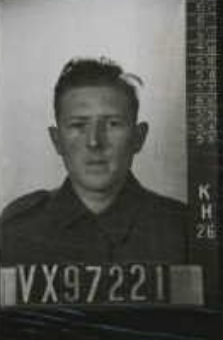BURT, Kenneth George
| Service Number: | VX97221 |
|---|---|
| Enlisted: | 1 May 1945 |
| Last Rank: | Private |
| Last Unit: | Australian Workshop Coy (WW2) |
| Born: | North Fitzroy, Vicotria, AUSTRALIA, 9 March 1927 |
| Home Town: | Not yet discovered |
| Schooling: | Not yet discovered |
| Occupation: | Fitter & Turner |
| Memorials: |
World War 2 Service
| 1 May 1945: | Enlisted Australian Military Forces (WW2) , Private, VX97221 | |
|---|---|---|
| 19 Sep 1946: | Discharged Australian Military Forces (WW2) , Private, VX97221, Australian Workshop Coy (WW2) |
Kenny, the Larrikin Soldier
On ANZAC Day 2024 I recalled the 1950s, when our parents were getting on with their lives, building homes and raising their families. Most of their generation had been deeply involved in WW2, so war stories and reminders were ever-present in our home.
However, one of my mother’s nephews, my cousin, a generation older than me, Kenneth George Burt (‘Kenny’) (VX97221) (1927-2014), remained in the shadows, seldom mentioned.
I only vaguely knew of his existence until much later in his life, when we established contact and became good friends.
Kenny was a self-confessed juvenile delinquent, which we might now see to be due to the absence of his father and an unwell mother. He was largely raised by his maternal grandparents during those lean Great Depression years.
In 1944, still only 17, Kenny enlisted in the 2nd A.I.F. After basic training, he was enroute to Darwin when, as he told it, the Military Police caught up with him and other boys, saying “you are under-age, go home and come back when you are 18.”
Kenny re-enlisted in May 1945, just a few months before the Japanese Surrender.
Trained as a sapper working on motor vehicles, he was posted to the then newly established British Commonwealth Occupation Force in Japan, arriving there on the troopship MV Duntroon in March 1946, after a one-month voyage via the big USN base at Guam.
The Australian Army base was near the port city of Kure, only a few kilometres from Hiroshima, where he walked the bombed streets, seeing at first-hand, the utter devastation caused by the atomic blast.
The major priority of the Allied forces at that time was the de-militarisation of Japan. There was an undefeated Japanese army of some 1 million in China and Korea (then Manchuria). The Allies, as part of their treaty obligations, used stripped-down Japanese warships to repatriate these fractious soldiers to the Japanese mainland.
Kenny was sent on one such mission. Ordered to give no quarter to quarrelsome Japanese soldiers, Kenny told of how he and his fellows enforced order using pick-handles and brute force in bloody confrontations.
But always the larrikin, Kenny did not suffer Army discipline gladly, and was constantly in trouble with his commanders. After six months in Japan, he returned to Australia and was demobilised in September 1946, under something of a cloud.
Kenny then undertook additional schooling and various work before finally settling to the slaughterhouse industry, becoming a committed unionist and, by his own report, living a rollicking life.
At Trades Hall, Melbourne, he was a confidant of the future Australian Prime Minister Bob Hawke, and of the communist-leaning author Frank Hardy. I recall that Frank had inscribed the front page of one his books as a dedication to Kenny, with the comment "Up the Slaughts!"
Kenny alternated seasonally for many years between the slaughterhouses in Portland, Victoria, and Invercargill, NZ, where, around 1970, he met and married the love of his life, Mavis Grant.
They shared an interest in horse racing, of which Kenny was an encyclopaedic authority and a keen punter.
After Mavis died in 2013, I held a regular conversation with Kenny by telephone, until he died of natural causes in Invercargill, At his own request, he is buried in the Military Section of Invercargill's Eastern Cemetary.
My objective in our regular conversations was to keep him company, albeit remotely, and be a link to his ageing Australian extended family, from whom he felt exiled. My reward was that I learned to appreciate that behind a gruff exterior, Kenny was a highly intelligent, sensitive man, widely read with a keen appreciation of history and a touch of Aussie humour.
Kenny Burt was very proud of his youthful military service, even though he nursed, to the last, the thought that his sergeant "had it in for him!"
Stephen Shedden
Submitted 12 May 2024 by Stephen Shedden









